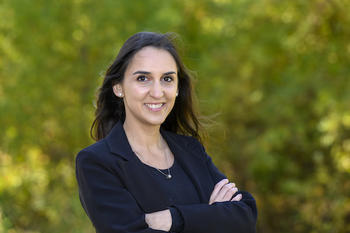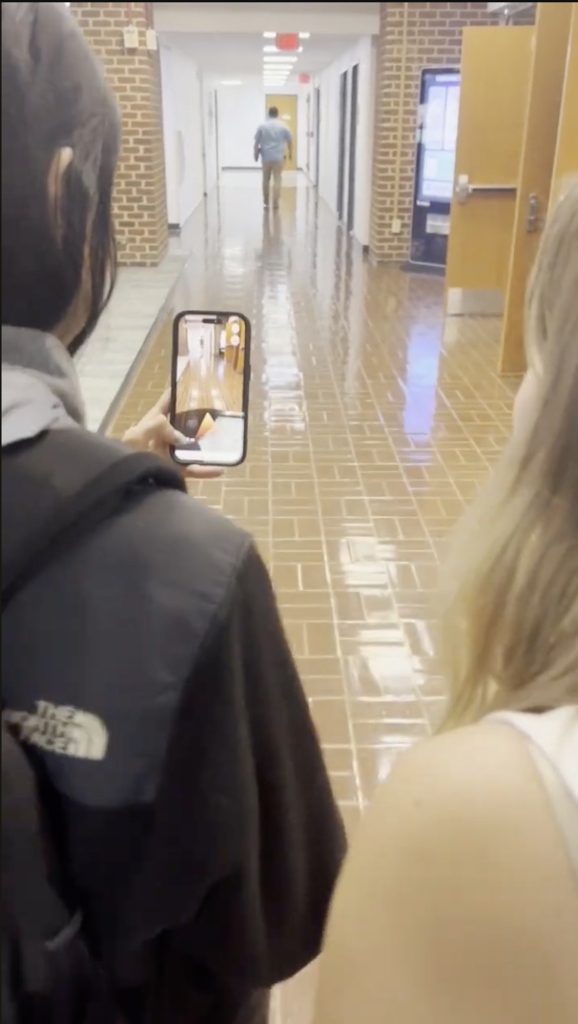A team from George Mason University is using augmented reality (AR) to create a smartphone app that will provide first-generation ADVANCE students with a virtual tour of the Fairfax Campus as they prepare to transfer from Northern Virginia Community College (NOVA).
ADVANCE is a collaborative effort between George Mason and Virginia’s community colleges to create a seamless pathway for students’ transfer to a four-year institution.

The AR project is co-directed by Kelly Schrum, a professor in George Mason’s Higher Education Program in the College of Humanities and Social Sciences, and Graziella Pagliarulo McCarron, an associate professor in the School of Integrative Studies.
The app, created using ARway, will provide students with interactive GPS tracking and indoor visual positioning through a geolocation feature, directing students to their location as they travel from point A to point B.
“One of the things this tool does really well is, if you say, ‘I’d like to find the gender-neutral bathroom,’ or ‘I would like to take the elevator,’ or ‘I would like to find disability services,’ you can select it from the directory, and it’ll basically hold your hand and guide you the whole way there,” said Schrum.
The team is focusing on the four floors in Student Union Building (SUB) I, which houses on-campus student support services including the Mason Student Services Center, Student Health Services, Student Success Coaching, and many more. Each floor gets a separate AR map, Pagliarulo McCarron said. After they map SUB I, Pagliarulo McCarron said they will start work on Fenwick Library and then the Johnson Center.
The app is funded by grants from George Mason’s Office of the Provost and 4-VA@Mason, which receives funding from the state to build collaborations across institutions as well as create new technologies that promote first-generation student transfer pathways to higher education.

Representatives from the First-Gen+ Center and undergrad, graduate, and PhD students are researching the common challenges transfer students face, including the need to find community, to incorporate those aspects into the app.
“Kelly and I talked a lot about possible tangible resources that would help create a stronger connection to George Mason for our students,” said Janette Muir, vice provost for academic affairs.
The team conducting the technology and digital humanities-based research includes many who are first in their family to go to college.
“Throughout this process, we learned that students felt disconnected and disoriented when they didn’t know how the campus was laid out,” said Muir, who is also director of the 4-VA@Mason program. “With the work that this team is doing, we could decrease that anxiety and help students access the services that are available to them.”
ADVANCE students currently attending NOVA are testing the app and providing feedback to the team.
In addition to student testers, ADVANCE has provided the team with aggregate data of qualitative and quantitative feedback received directly from students through an Ask an ADVANCE Student Ambassador forum on the program’s Canvas course. This information helps the program identify what students are most focused on throughout through transfer journey and time in ADVANCE.
“My hope with providing that additional data is to help narrow down what should be covered in the tours and what could be helpful to incorporate into the app,” said Jason Dodge, the executive director of community college partnerships at George Mason.

“The AR campus tour and ADVANCE both highlight that transfer is not the responsibility of a single office, but that it takes a collective of folks across the university in order to pull something like that off,” said Dodge.
Schrum said several students from the graduate course HE 703 Higher Education in the Digital Age are working on the project. Team instructional designer Mariya Khan gave an in-person interactive presentation on AR and gamification to the class.
“Kelly saw how the AR I used in my presentation could be infused into what she envisioned for this project,” said Khan, who works in the Stearns Center for Teaching and Learning.
“I’m a first-generation American, so I understand why projects like this are important,” Khan added. “It would be super helpful to students who want to feel more engaged and like they’re part of something.”

Veronica Visser, a master’s student in higher education and leadership, has been a part of the project since its inception.
“As a first-gen international student, sometimes it can feel like you just go to campus, go to your lecture, and then you go back home,” said Visser, who is from Paraguay. “But with resources like the AR app, you learn that there are people available to help you with your resume, to help you with time management, getting your Mason [ID] card, or other resources that will make you a better student and person.”
The team will conduct a second round of user testing on the app this summer.
“Although we are focusing on first-gen transfer students for now, the project has a lot of potential to expand to other underrepresented minorities, and we’re excited to explore that,” said Schrum.
Currently this augmented reality experience is only mapped for Student Union Building I. The Johnson Center and Fenwick Library are both on the list to receive a similar AR map.
Related News
- December 11, 2025
- November 25, 2025
- November 17, 2025
- October 9, 2025
- July 1, 2025

